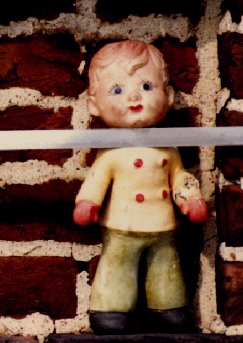
“Coffee?”, Mrs. Coates asked. A peculiar, grown-up question. I said yes, the grown-up thing to do, and she poured the dark liquid into a paper cup marked with squiggly lines and set the cup in front of me. I was in sixth grade. I wrapped my hands around the cup like I’d seen women do who sit alone at the Tip Top, staring out the window, waiting. The cup was cold.
The counselor reached for one of my hands. “This is hard to say,” she began. I’d been called down to her office over the intercom, pulled out of base 6 drills in Advanced Math. Mrs. Coates’ eyes were moist. I looked at the oily film that swirled the surface of my coffee. Mrs. Coates cleared her throat. “Your brother Allen tried to jump out a window today.” I knew the words made up a complete sentence, I recognized a subject and a predicate. Why, then, didn’t it make sense?
“What?”
“He was being teased in class.” My brother was a senior in high school, less than a month from graduation. “I suppose he got fed up, so he went to the window and threatened to jump.” Mrs. Coates sniffled. My own nose began to run. “He’s at Lutheran General now.”
Five South, I thought. A mythical floor of the hospital where kids went when their parents learned they were doing drugs, when they ODed. When they attempted suicide. There’d be whisperings in the school hallways sometimes about a classmate—a popular cool kid: You hear about Sam? Five South, man. And it was like a badge of honor, like the stirrings of a legend. But my brother, high-strung and bespectacled, the target of teasing and jokes, was not popular. He was not cool. Allen was, however—then, and many, many times since—suicidal.
“Your mom will be here soon to get you.” Mrs. Coates handed me a tissue. “Shall I wait with you?” I shook my head.
Alone in the office, I took a swallow of the cold coffee. It tasted like rusted metal, nearly impossible to keep down. One time when I was six or seven, I’d been painting with one of those long, skinny tins of watercolors. I filled a drinking glass with water to clean my brush. The color of the water became increasingly brown, and when I stirred it up, it developed a frothy head like root beer. Allen loved root beer, and—to be funny, I thought—I told him that’s what this was. “Drink it,” I said. He took a big swig, and, as soon as he tasted it, spit it out. He looked at me through his glasses, the effect of my betrayal in his eyes.
While I waited for my mother in the counselor’s office, I remembered that look. I lifted the foul cup of oily cold coffee. “Drink it,” I said. And I did.
Patricia Ann McNair teaches in the Fiction Writing department at Columbia College Chicago, and has had creative nonfiction accepted by a number of publications, most recently EnRoute, Air Canada’s in-flight magazine, and Fourth Genre. She won an Illinois Arts Council Literary Award for nonfiction and an IAC Fellowship in prose, as well as a Pushcart nomination for an essay published in Sport Literate.
Photo by Dinty W. Moore
